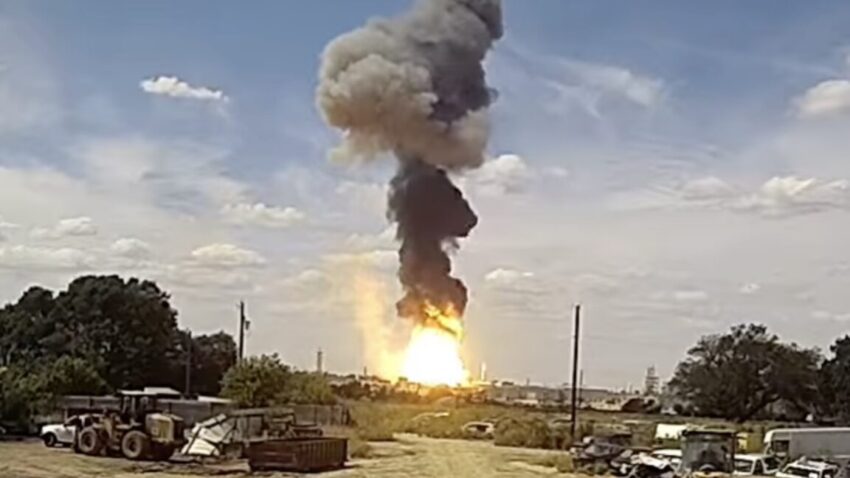
another setback for firefly aerospace s beleaguered Firefly Aerospace’s Alpha rocket program has encountered another significant setback following the destruction of its booster stage during a test at the company’s facility in Central Texas.
another setback for firefly aerospace s beleaguered
Incident Overview
On Monday, the booster stage of Firefly Aerospace’s next Alpha rocket was destroyed in a fiery accident while undergoing testing on the vertical test stand located in Briggs, Texas. This incident occurred as engineers were preparing the rocket for shipment to Vandenberg Space Force Base in California, where it was slated for launch later this year. The mission was intended to deploy a small commercial satellite for Lockheed Martin, a significant milestone for the company.
Details of the Test
The testing activities at the Briggs facility included crucial procedures such as propellant loading and test-firings of the rocket’s four kerosene-fueled engines. These tests are vital for ensuring that the rocket’s systems function correctly before it is transported to the launch site. Unfortunately, during one of these test-firings, the accident occurred, leading to the destruction of the booster stage.
Company Response
In the aftermath of the incident, Firefly Aerospace released a statement confirming that the rocket “experienced an event that resulted in a loss of the stage.” The company emphasized that all personnel involved in the testing were safe and that ground teams adhered to “proper safety protocols.” This assurance is critical, as safety remains a paramount concern in aerospace testing, particularly following incidents that can jeopardize both human life and valuable equipment.
Implications for Firefly Aerospace
This latest setback is particularly concerning for Firefly Aerospace, which has faced a series of challenges since its inception. The Alpha rocket program is essential for the company’s long-term strategy, which includes providing affordable launch services for small satellites. The loss of the booster stage not only delays the upcoming launch but also raises questions about the reliability of the Alpha rocket, which has already experienced multiple delays and technical issues.
Historical Context
Firefly Aerospace was founded in 2014 with the goal of developing a small satellite launch vehicle that could compete in a growing market. The Alpha rocket is designed to carry payloads of up to 1,000 kilograms to low Earth orbit, positioning it as a viable option for commercial satellite operators. However, the program has faced numerous hurdles, including funding challenges, technical difficulties, and delays in development timelines.
The company had initially planned to conduct its first orbital launch in 2020, but various setbacks have pushed that timeline back significantly. The recent incident at the Briggs facility is yet another blow to the company’s aspirations, as it seeks to establish itself as a reliable player in the competitive space launch market.
Market Context and Competitive Landscape
The small satellite launch market has seen explosive growth in recent years, driven by the increasing demand for satellite-based services such as telecommunications, Earth observation, and scientific research. Numerous companies, including established aerospace giants and new startups, are vying for a share of this lucrative market. Firefly Aerospace’s Alpha rocket is designed to fill a niche in this market, but the recent setbacks may hinder its ability to compete effectively.
Competitors in the Small Satellite Launch Market
Firefly Aerospace is not alone in its pursuit of the small satellite launch market. Several competitors are also developing their own launch vehicles, including:
- Rocket Lab: Known for its Electron rocket, Rocket Lab has successfully launched numerous small satellites and has established a strong reputation in the industry.
- Virgin Orbit: Utilizing a unique air-launch system, Virgin Orbit has also made strides in the small satellite launch sector, offering a different approach to reaching orbit.
- Relativity Space: This company is focused on 3D-printed rockets and aims to streamline the manufacturing process, potentially reducing costs and increasing launch frequency.
These competitors have made significant progress in their respective programs, and Firefly Aerospace’s recent setbacks may allow them to gain further ground in the market. The ability to deliver reliable and timely launches is crucial for attracting customers, and any delays in Firefly’s schedule could lead potential clients to seek alternatives.
Stakeholder Reactions
The reaction from stakeholders, including investors, customers, and industry analysts, has been mixed following the latest incident. While some express confidence in Firefly Aerospace’s ability to recover and learn from its challenges, others are more skeptical about the company’s future prospects.
Investor Sentiment
Investors have closely monitored Firefly Aerospace’s progress, particularly given the company’s ambitious plans and the increasing competition in the small satellite launch market. The destruction of the booster stage may raise concerns about the company’s ability to execute its strategy effectively. Investors often seek assurance that their capital is being utilized efficiently, and repeated setbacks can lead to diminished confidence.
Customer Concerns
Customers, particularly those who have contracted Firefly Aerospace for upcoming launches, may also be feeling anxious about the company’s reliability. The loss of the booster stage could lead to delays in scheduled launches, prompting customers to reconsider their options. For companies like Lockheed Martin, which had planned to utilize Firefly’s services, the incident may necessitate a reevaluation of their launch strategies.
Future Prospects
Despite the challenges it faces, Firefly Aerospace remains committed to its mission of providing affordable launch services for small satellites. The company has indicated that it will conduct a thorough investigation into the cause of the recent incident and implement any necessary changes to its processes and systems to prevent future occurrences.
Next Steps for Firefly Aerospace
Moving forward, Firefly Aerospace will need to focus on several key areas:
- Investigation and Analysis: Conducting a comprehensive investigation to determine the root cause of the booster stage failure will be essential. This analysis will help the company identify any design flaws or operational issues that need to be addressed.
- Revising Timelines: The company will likely need to revise its launch timelines based on the findings of the investigation. Clear communication with stakeholders about updated schedules will be crucial for maintaining trust.
- Enhancing Safety Protocols: While Firefly has stated that proper safety protocols were followed, the incident may prompt a reevaluation of existing safety measures to ensure that future tests are conducted with the highest level of caution.
Conclusion
The recent destruction of Firefly Aerospace’s Alpha rocket booster stage is a significant setback for the company and raises questions about its future in the competitive small satellite launch market. As the company works to investigate the incident and implement necessary changes, stakeholders will be watching closely to see how Firefly navigates this challenging period. The outcome of this situation could have lasting implications for the company’s reputation and its ability to attract customers in an increasingly crowded marketplace.
Source: Original report
Was this helpful?
Last Modified: September 30, 2025 at 5:37 am
1 views















